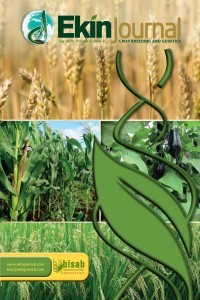Anther Culture in Red Cabbage (Brassica oleraceae L. var. capitata subvar. rubra): Embryogenesis and Plantlet Initiation
Anther Culture in Red Cabbage (Brassica oleraceae L. var. capitata subvar. rubra): Embryogenesis and Plantlet Initiation
Cabbages, cauliflower and broccoli breeding activities are very low level compared with the other vegetable species.
This study was conducted to determine the efficacy of the anther culture technique on the in vitro embryogenesis and
according plantlet initiation and to the author’s knowledge, this is the first reports in red cabbage species. The anthers at
uninucleate microspore stage (about 3-5 mm long) were collected at florescence times and then cultured on a solid MS
and B5 medium with the addition of 2,4-D, NAA, Glutamine, Serine, Silver nitrate, IAA, BAP and different sucrose
concentration to induce callogenesis, embryogenesis, and plantlet initiation. The culture medium, sucrose concentration,
and genotype were found to be highly effective on androgenesis. Among the genotype, Zencibas cv. produced the best
result with a combination of M medium+30 g/l sucrose for embryogenesis and plantlet initiation, while, Integro F1
and
Cabellero F1
did not generate an androgenic response. This results can assist cabbage breeders to develop new hybrid
cultivars in breeding programs
Keywords:
Red cabbage, anther culture, embryogenesis plantlet initiation.,
___
- Balkaya A, Yanmaz R, Apaydın A (2005). Morphological characterisation of white head cabbage (Brassica oleracea var. capitata subvar. alba) genotypes in Turkey. New Zealand Journal of Crop and Horticultural Science. 33:333-341.
- Balkaya A, Sarıbaş Ş, Özgen T (2016). The last status of winter vegetable species in Turkey. Turkish Seed Union Magazine, 5(20):8-12.
- Cardoza V, Stewart CN (2004). Brassica Biotechnology: Progress In Cellular and Molecular Biology. In Vitro Cellular & Developmental Biology-Plant 40:542-551.
- Custers JBM (2003). Microspore culture in rapeseed (Brassica napus L.). In: Maluszynski M, Kasha KJ, Forster BP, Szarejko I (eds.): Double Haploid Production in Crop Plants. Kluwer, Dordrecht 185-193.
- Dias JS (1999). Effect of activated charcoal on Brassica oleracea microspore culture embryogenesis. Euphytica 108: 65-69.
- Dogru SM, Balkaya A (2015). The Different Applications for Shortening Seed Production and Their Effect Mechanism in Cabbage. Alatarım Dergisi 14 (2): 29-37.
- Mousa Magdi AA, Ashraf GH, Hassan SA, Mohammed FM (2014). Improved androgenesis of broccoli (Brassica oleracea var. italica) anthers using sucrose and growth regulators. Asian Journal of Crop Science. 6(2): 133.141.
- Weber S, Unker W, Friedt W (2005). Improved doubled haploid production protocol for Brassica napus using microspore colchicine treatment in vitro and ploidy determination by flowcytometry. Plant Breeding. 124: 511-513.
- Zhang W, Fu Q, Dai XG, Bao MZ (2008). The culture of isolated microspores of ornamental kale (Brassica oleracea var. acephala) and the importance of genotype to embryo regeneration. Scientia Horticulturae. 11: 769-772.
- Krzyżanowska D, Krystyna G, Waldema K, Urszul K (2006). The Effect Of Genotype And Medium On Plant Regeneration From Androgenic Embryos. Journal of Fruit and Ornamental Plant Research Vol. 14 (1) 121:127.
- Wakui K, Takahata Y, Kaizuma N (1994). Effect of abscisic acid and high osmoticum concentration on the induction of desiccation tolerance in microspore-derived embryos of Chinese cabbage (Brassic
- ISSN: 2149-1275
- Yayın Aralığı: Yılda 2 Sayı
- Başlangıç: 2015
- Yayıncı: Bitki Islahçıları Alt Birliği
